Less than a year old, an organization focused on wildlife management in Washington is challenging the state’s proposed spring bear hunt. For starters
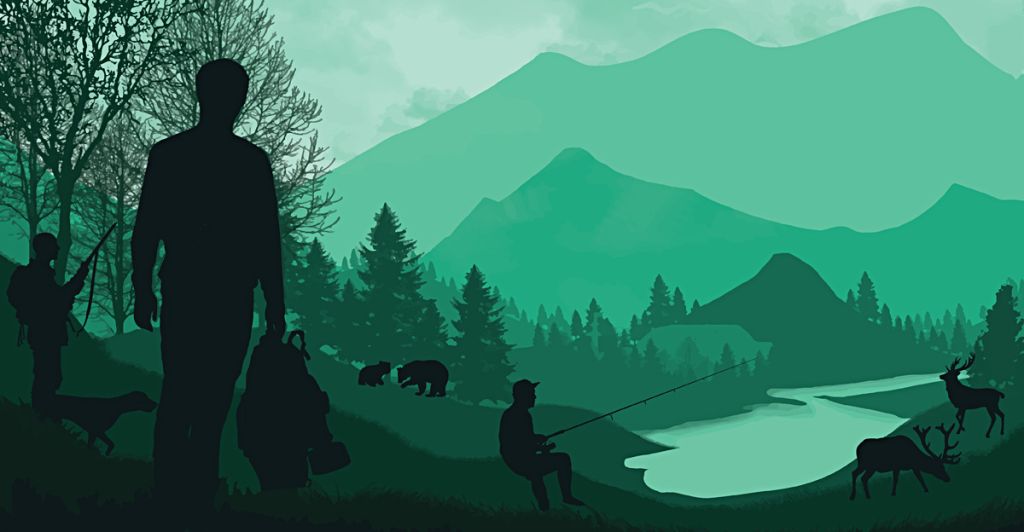
Managing a dilemma: Lots of users. Lots of agendas. And new scrutiny of the agency in charge. Illustration: Mackenzie Miller
By Dawn Stover. March 17, 2022. Last November, a 4-4 split decision by Washington’s Fish and Wildlife Commission prevented the state’s wildlife department from moving forward with a controversial spring bear hunt in 2022.
The decision meant there would be no spring hunt for the first time in decades. Instead, the commission would take time to review the science and a flood of negative public comments.
Now the hunt may be back on.
MORE: Contentious Washington spring bear hunt put on hold
At a special meeting in late January, after a resignation that gave a temporary advantage to proponents of the hunt, the commission’s remaining members voted 4-3 to accept a petition from a pro-hunting group and begin rule-making for a spring bear season.
Last Friday, the commission held a special Web conference to hear a briefing from department staff and take public testimony. A final decision is expected at the Commission’s virtual meeting on March 19. (UPDATE: On March 19, the Washington Fish and Wildlife Commission voted 5-4 against the proposed 2022 spring bear-hunting season.)
Washington Wildlife First, a nonprofit group formed only seven months ago, says the abrupt reversal—and the way it happened—demonstrates how Washington’s Fish and Wildlife Department prioritizes hunting over conservation, and too often fails to present a balanced view of what the science says.
[perfectpullquote align=”full” bordertop=”false” cite=”” link=”” color=”” class=”” size=””]With its #NotMyWDFW, the group says wildlife managers are biased in favor of maximizing hunting opportunities[/perfectpullquote]
The agency is “dysfunctional,” says Claire Loebs Davis, president of Washington Wildlife First and an environmental attorney.
Her group’s first campaigns have targeted the spring bear hunt and the make-up of the Fish and Wildlife Commission.
But Davis says Washington Wildlife First’s goal is much broader: “reform of the wildlife agency and the manner in which it makes decisions. If we can achieve that, better decisions will follow.”
‘A politicized quagmire’
Samantha Bruegger remembers the day Fred Koontz resigned from the Fish and Wildlife Commission. It was December 13, 2021, her first day as executive director of Washington Wildlife First.
Koontz, a retired conservation biologist less than one year into his six-year term as a commissioner, said in his resignation letter that the commission was stuck in “a politicized quagmire” that left him with “no meaningful role in protecting the public’s wildlife trust.”
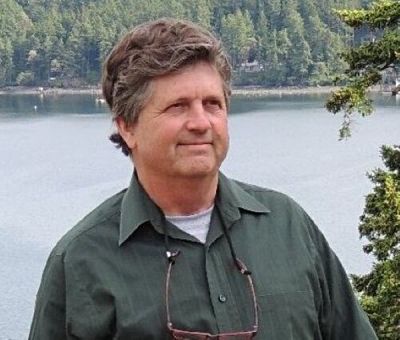
Out of the mire: Fred Koontz. Photo: WDFW
The commission is normally comprised of nine citizens: three from western Washington, three from eastern Washington and three at-large members.
The panel, which sets policy for the Washington Department of Fish and Wildlife (WDFW), is appointed by the governor and confirmed by the state Senate.
The governor appointed three new commissioners on January 24: one to replace Koontz, one to fill a vacant seat and one to replace a commissioner whose term expired in late 2020 but who had continued to serve on the commission.
But just three days before the new commissioners took their seats, the existing commission voted to revive the spring bear hunt.
Agency biologists had recommended that the state approve the hunt. However, several commissioners—most notably, Koontz—had questioned the science behind the recommendation, and opponents of the hunt cited scant public approval for the killing of black bears just emerging from hibernation.
In a 2019 nationwide survey, only 15 percent of respondents in the West approved of hunting bears in spring.
The proposed hunt
If the draft rule for a spring black bear special permit season is adopted, WDFW will issue 664 hunting permits, and the season will be open from May 1 to June 15 in four regions of the state.
The draft rule includes a new prohibition against killing offspring (bears that are less than a year old or weigh less than 50 pounds) or females with offspring, although WDFW acknowledged this prohibition would be “challenging to enforce.”
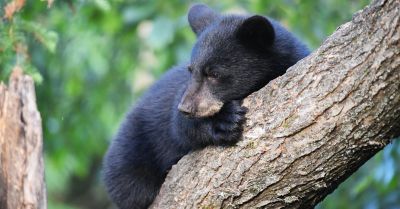
Safe quarters? Motherless cubs are just one concern surrounding spring bear hunts. Photo: Courtney Celley/USFWS
At the March 11 briefing, Stephanie Simek, the carnivore section manager of WDFW’s game division, said the department expects approximately 150 bears to be killed during the spring hunt—a level she said is typical of past years and “sustainable.” (Washington also has a fall bear hunting season, when roughly 2,000 bears are typically killed.)
She said most bears are out of their dens by the end of March, and that bears emerging from hibernation are “not as lethargic as people think.”
Simek made a distinction between scientific and social concerns about spring bear hunting.
She cited the new rule banning the killing of females with cubs as “an example of where we’re responding to a social issue.”
Permanent change
From Bruegger’s perspective, the proposed rule is “even worse than before.”
Previously, the hunt had to be reauthorized every year, and was justified as a way to achieve management goals, such as reducing timber damage and human-bear conflict, and conserving deer and elk populations.
If the draft rule is approved, the hunt will become permanent.

Challenging position: Claire Loebs Davis, president, Washington Wildlife First. Photo: WWF
The wildlife department “can’t substantiate the management need with data,” Davis says. “But instead of reconsidering the hunt, the department just shifted seamlessly into calling this a longstanding traditional recreational opportunity that would be unfair to discontinue.”
Spring is off-limits for most hunting because it’s a time when many animals have vulnerable offspring, says Davis. “Why are we treating bears differently than every other game species except turkeys?” asks the Washington Wildlife First president.
In scathing testimony on March 11, Bruegger criticized the process that reinstated the spring hunt. She said some proponents of the hunt had made verbal attacks on, and threats against, Koontz and Commissioner Lorna Smith, who was also appointed in January 2021.
“I have never heard the rest of the commission stand up for their colleagues and condemn this behavior,” she said. “Instead, some members of this commission publicly encouraged these bullies to bring a rule-making petition asking for the November decision to be reversed after Commissioner Koontz resigned.
“Is this really the precedent you want to set? Do you want to tell the public that whenever we do not like a decision, we should use threats and intimidation to get our way? Through this whole process, the department management has had its thumb on the scales to advance its own agenda.”
She pointed to a December 8 regional open house, reported in Northwest Sportsman, at which WDFW Director Kelly Susewind acknowledged “a lot of negative feedback on the hunt.”
Susewind, who has himself hunted for spring bear, told the audience: “We’re going to be working our butts off on the agency side” to get the hunt back.
Hunters fight back
The March 11 public hearing included equally impassioned testimony from hunters, who were significantly outnumbered at commission meetings last fall.
Hunting groups say they weren’t properly notified that the commission might rule out a 2022 hunt altogether.
They sprang into action after the split vote.
At the March 11 hearing, more than 200 people signed up to speak, many of them hunters who said they value the chance to hunt in the spring and to obtain meat for their families. They argued that the spring hunt would make little difference to the state’s overall bear population.
MORE: The ethics of hunting bears in spring
“Hunting is the conduit for developing deep bonds and lifelong memories with my family and the people that I hunt with,” said Bryce Levin, a volunteer conservation and policy leader with the Washington chapter of Backcountry Hunters & Anglers. “Canceling a season, utilizing a loophole and catering to a vocal minority who oppose all hunting is in direct defiance of your mandate as a commissioner.”
Some hunters who spoke at the recent hearing alleged that one or more commissioners are anti-hunting.
Hunting groups have complained that the appointments of Koontz and Smith last year threw the commission out of balance and were not properly vetted. They said hunters should have a greater say in commission appointments and decisions, in part because hunting licenses help fund WDFW’s budget.
Reconstituted commission
Even if the three recently appointed commissioners approve the draft rule for spring bear hunting, Washington Wildlife First considers their appointments a victory. The new commissioners are widely viewed as more science-friendly than some of their predecessors.
The nonprofit, along with 28 other environmental groups, signed a December letter urging the governor to make new appointments.

Savings planner: Samantha Bruegger. Photo: WWF
Bruegger says a “unified voice” and “constant pressure” paid off: “We were really impressed by the candidates that were appointed.”
The new commission members are John Lehmkuhl, a wildlife biologist and lifelong hunter from eastern Washington; Tim Ragen, a marine mammal biologist from western Washington; and Melanie Rowland, an environmental attorney appointed to an at-large position.
“We are encouraged to see the type of thoughtful discussion and critical look at data that the commission is engaged in now,” says Davis. The commission “is not operating as a rubber stamp for the department. That is a very positive development.”
Bears are not the only issue on Washington Wildlife First’s agenda. The group also plans to look into the state’s management of cougars and wolves.
With its #NotMyWDFW campaign, the group aims to show that state wildlife managers are biased in favor of maximizing hunting opportunities—and dismissive of Washingtonians who care about wildlife but are not hunters, trappers or anglers.
In a 2018 survey of WDFW employees, part of the America’s Wildlife Values project, more than two thirds of respondents said that, if forced to choose, their agency would prioritize politics over science, and traditional stakeholders over the general public. Almost two thirds of WDFW employees who responded to this survey had fished in the past year, and two in five had hunted, far more than the general public in both instances.
According to 2020 data from the U.S. Fish and Wildlife Service, 2.3 percent of Washington residents pay for a hunting license. Applications for licenses have been declining in recent years.
“We are not anti-hunting,” says Bruegger. “We are pro-science.”
Illegal activities
Washington Wildlife First is also raising concerns about bullying and illegal activity within WDFW.
A performance audit of WDFW’s workplace culture, published by the state auditor in September 2021, reported that employees described “widespread unprofessional behavior” including bullying, fear of retaliation and legal or ethical violations—for example, issuing untracked hunting permits or allowing the over-harvesting of game.
One in 10 WDFW employees said they’d witnessed a co-worker commit a legal or ethical violation in the past year. More than two dozen employees said WDFW had made decisions on sensitive topics that appeared to contradict the department’s own research and staff recommendations.
Washington Wildlife First also plans to bring new scrutiny to Washington’s Department of Natural Resources and its logging practices on state trust lands.
But for now, the group has WDFW in its crosshairs.
“Both the commission and the public should be able to rely on the department to present facts honestly and transparently,” says Davis. “Fish and wildlife belong to the people of the state, not just to the people who want to fish and hunt them.”


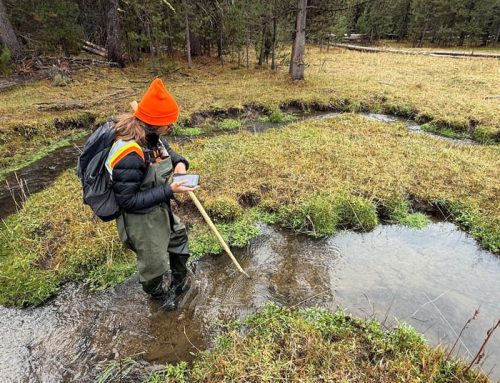
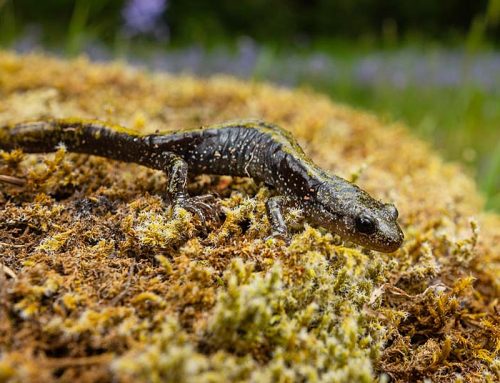

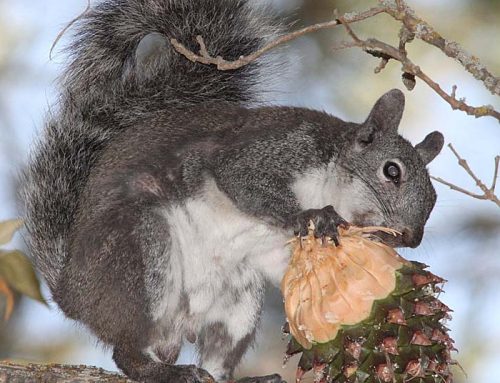
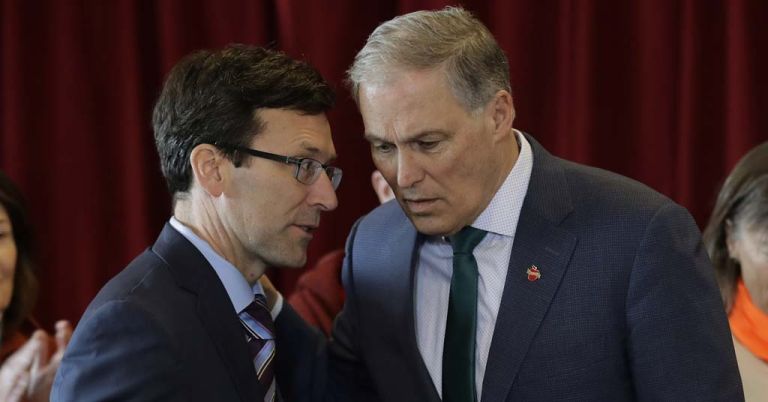
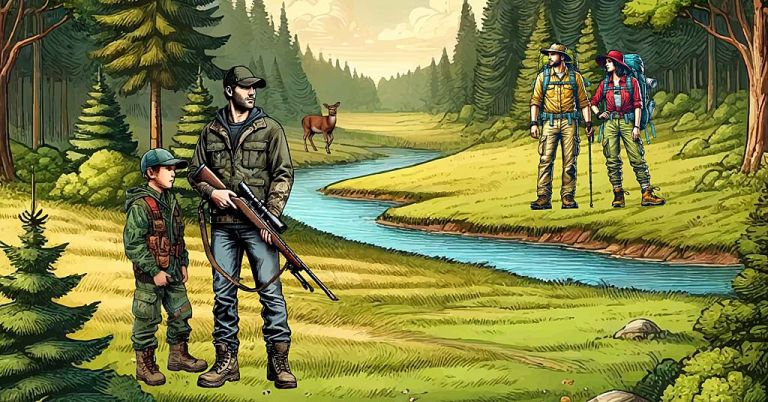
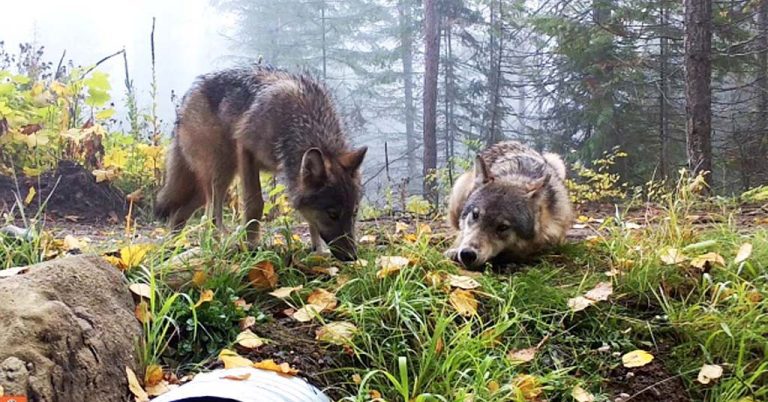
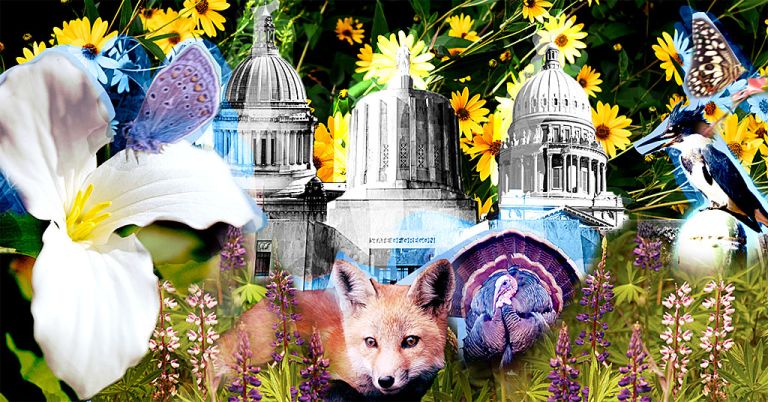


Thanks for this. Lots of emotional testimony from the pro-hunt side at the WDFW Commission hearing last week, mostly along the lines of “I wanna”. Interesting that almost to a person, the pro0hunt testimony insisted that the staff report was the “best available science” and very fair and well-done. The point made by opponents of the spring bear hunt was that there is little or no data to support conclusions or management decisions. I thought the Department’s bias showed through this whole process very clearly, and I’ve attended all the Commission meetings on this subject.
Thanks for bringing attention to this new group.
I am an anti hunting, liberal Seattle area born transplant here in the mount adams foothills. The one thing I have heard over and over from local ranchers, farmers, foragers, long time recreation partakers, lifelong residents as well as experienced myself is the increase of black bear and cougar predation on livestock, pets, ungulates. Increased negative interactions of humans with bear and cougar seems to be the most heard complaint. I can’t tell you how many times I have heard of a bear charging, chasing, or otherwise harassing people in areas that are traditionally and historically frequented and used by humans. Cougar have been known to stalk, harassment , and even “fake” lunge towards people as well. I have spoken to people whom have even been chased by cougar. Normal hiking trails are now dotted with bear marking trees, scat and cougar prints. I have seen local schools have to lock down. School sporting events interrupted, cancelled, and spectators and parents told over loud speakers to pick up small children and walk slowly to their cars immediately as a cougar in the neighborhood had just killed several nearby goats and had made its way onto school grounds. Several horses were killed in one spot in one night by just one cougar. Cougar in neighborhoods where kids wait for their school bus. I even know of someone who walked out to their garage to get in their car to go to work and came upon a massive cougar. This spring, in traditional and historically human used areas, I myself, have been charged by black bear 3 times on trails!! This does not account for when I turned a corner and came upon a black bear looking at me with ears laid back chomping and huffing at me, or when I was quite literally escorted out of the forest by a male black bear, huffing, woofing, growling, and clacking. That literally followed us for over a mile as we headed back to the car. My boyfriend personally had a very large cougar lunge then stop at him and hiss in a well populated campground. Couple that with the longtime locals commenting about the seemingly significant rise in the number of cougar and black bear seen and the decline of deer and elk in the area. One only has to look at DNR Forest Practice Maps to see one of the main issues. Massive logging by DNR on public and trust land over the last 10-20 years displays the states own culpability in the mismanagement of timberland. The loss of habitat for these top predators is pushing them closer to human interaction. How many negative UNREPORTED interactions are taking place each year? I would guess that the number probably doubles, triples, or even quadruples the number of reported events. Hunters and outdoorsy folks are pretty tough. They don’t report these interactions and just chalk it up to a memorable experience. While I absolutely fundamentally disagree with Bob Songer on just about EVERYTHING, I applaud that there is at least one official willing to take up for the rural residents and hear their concerns. I don’t like hunting. I am vehemently opposed to killing anything out of sport. But I see the need to manage the populations in certain areas. There cannot be a one size fits all fix. Every area is different. All any WDFW official needs to do is put boots on the ground and listen to the local communities and tribes. Making decisions on their own personal values only hurts the communities and tribes in rural areas and lessens the integrity of of the WDFW.